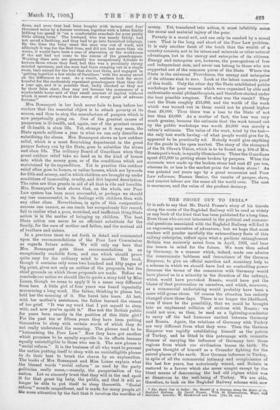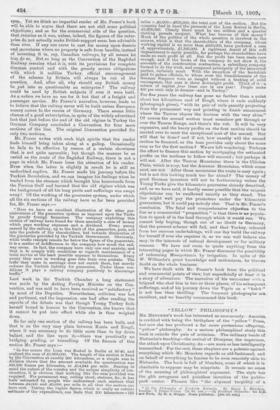THE SHORT CUT TO INDIA.*
Pr is safe to say that Mr. David Fraser's story of his travois along the route of the Baghdad Railway will be read as widely as any book of the kind that has been published for a long tithe. Even those who are not interested in the political and commer- cial questions associated with the Baghdad Railway will find it an engrossing narrative of adventure; but we hope that most readers will ponder carefully the extraordinary facts of this railway enterprise, reflect upon what a perilous entanglement Britain was narrowly saved from in April, 1903, and bear the lesson in mind for the future. We were then asked by Germany, in a manner which, indeed, made one admire the consummate boldness and. insouciance of the German Emperor, to give an official sanction and monetary help to a scheme in which we should have had no controlling power (because the terms of the connexion with Germany would have placed us in a minority in the direction of the railway), which would have provoked Russia, would have put the blame of that provocation on ourselves, and which, moreover, as a commercial undertaking would probably have been a mere wild-goose chase. Of course the situation has entirely changed since those days. There is no longer the likelihood, even if there be the possibility, that we could be brought into an unpleasant collision of motives with Russia ; we could not now, as then, be used as a lightning-conductor to carry off the bad humours excited between Germany and Russia. Again, the relations of Germany with Turkey are very different from what they were. Then the German Emperor was rapidly establishing himself as the patron of Turkey, and he fitted in this patronage with romantic dreams of carrying the influence of Germany into those regions from which our civilisation traces its birth. He perhaps thought of hireEelf as a Crusader fighting for the mired places of the earth. Now German influence in Turkey, in spite- of all the commercial intimacy and complaisance of the last few years, has notoriously waned, and Britain is restored to a favour which she never sought except by the blunt means of denouncing the bad old regime which was so. disastrous to the well-being of Turkey. We are able, therefore, to look on the Baghdad Railway scheme with new * The Short Cut to India: the Record of a Journey along the Route.of the Baghdad Railway. By David. Fraser. With 90 Illustrations, Maps, ntyl, Sketches. London, W. Blackwood and Bona, [12a, 64. net.]
eyes., Yet we think no impartial reader of Mr. Fraser's book will be able to argue that there are not still some political objections; and as for the commercial side of the question, that remains as it was, unless, indeed, the figures of the enter- prise do not actually make British support seem less advisable than ever. If any one cares to cast his money upon deserts and, mountains where no property is safe from bandits, instead of 'investing it in, say, Canadian railways, by all means let him do so. But so long as the Convention of the Baghdad
Railway remains what it is, with its provisions for complete German control and with the grossly severe obligations with which it saddles Turkey, official encouragement of the scheme by Britain will always be out of the question. And, after all, why should any British money be put into so questionable an enterprise ? The railway could be used by British subjects if ever it were built. As a nation we have no use for it but that of a freight and .passenger service. Mr. Fraser's narrative, however, leads is to believe that the railway never will be built unless European money comes to the rescue of Germany. There seems little chance of O. good subscription, in spite of the widely advertised fact that just before the end of the old regime in Turkey the German Company concluded a Convention for four more sections of the line. The original Convention provided for only two sections.
Mr. Fraser writes with such high spirits that the reader finds himself being taken along at a gallop. Occasionally he fails to be effective by reason of a certain showiness that is not quite agreeable; but though the manner be as varied as the route of the Baghdad Railway, there is not a page in which Mr. Fraser loses the attention of his reader. Even when the latter is slightly in revolt he is still an undoubted captive. Mr. Fraser made his journey before the Turkish Revolution, and we can imagine his feelings when be landed from the steamer which brought him homewards from the Persian Gulf and learned that the old regime which was the background of all his long perils and sufferings was swept away I Of the working of the guarantee system, under which all the six sections of the railway have BO far been provided for, Mr. Fraser says :— " Here we have an excellent illustration of the utter per- niciousness of the guarantee system as imposed upon the Turks by greedy foreign financiers. The company exploiting this section of railway have found for them annually a sum of money which pays working expenses and a dividend. Every penny earned by the railway, up to the limit of the guarantee, goes, not into the pockets of the shareholders, but towards diminution of the guarantee provided by the Turkish Government. Obviously, while traffic receipts remain far below the figure of the guarantee, it is a matter of indifference to the company how much the rail- way earns. In fact, the company have only one real anxiety, and 'that, is to comply with conditions as regards maintenance of a train service at the least possible expense to themselves. Every penny they save in working goes into their own pockets. The trifle they make in earnings does not enrich them, but merely reduces the Turkish liability for guarantee. Under these con- ditions it pays a railway company positively to discourage traffic."
Last week in the Turkish Chamber a long statement was made by the Acting Foreign Minister on the Con- vention, and was said to have been received as " satisfactory " by most of the Deputies. Nevertheless, criticism was hot and pertinent, and the impression one had after reading the reports of the debate was that though Young Turkey feels herself bound in honour to the Convention, she knows that it cannot be put into effect while she is thus weighed
down.
$o far only one section of the railway has been built, and that is on the very easy plain between Konia and Eregli, where it was necessary to do little more than to lay down ballast and the line upon it,—there was practically no bridging, grading, or tunnelling. Of the finance of this section Mr. Fraser says :—
"In duo course the Loan was floated in Berlin at 86.40, and realised tho sum of 41,868,000. The length of the section is fixed by Convention at exactly 200 kilometres, so a simple sum in diicsion shows that the amount available for construction was 233,500 'francs per kilometre, or 414,941 per mile. Bearing in mind the nature of the country and the unique simplicity of con- struction, it is obvious that nothing like the sum provided was required. For permanent way, rolling stock, stations, &c., it has bean estimated by people who understand such matters that between-44,000 and 46,000 per mile is all that the section can havo cost. Taking the higher figure, which is really an outsido estimate of the expenditure, one finds that 200 kilometres =125 miles x 45,000=4626,000, the total cost of the section. But the company had in hand tho proceeds of tho Loan floated in Berlin, 41,868,000. Clearly there must be one million and a quarter sterling pounds unspent. What has become of this money P Much of the politics of the whole question is involved in the answer, which is that the shareholders of the company, whose working capital is no more than 4300,000, have pocketed a sum. of, approximately, 41,243,000. A righteous denial of this soft impeachment is easily possible, for perhaps the shareholders have made no such profit at all. But the profit Inie been made sure enough, and if the books of the company do not show it, tho accounts of the construction contractors, a subsidiary company formed to do the work, and composed principally of the interested parties, certainly must. With the exception of the backshish paid to palace officials, to whom even the blandishments of the German Emperor were as naught without a backing of solid recompense, this sum is sheer downright profit. Think of it—a return of capital four times over in one year! People make 400 per cent. only in dreams—and in Turkey."
For five years the railway has gone no farther than a point
about ten kilometres east of Eregli, where it ends suddenly (photograph given), "with its pair of rails gauntly projecting
from the permanent way and pointing in dumb amazement where the Taurus shares the horizon with the very skies." Of course the second section must somehow get through or over the Taurus Range, and there's the rub. It will be very expensive, and the heavy profits on the first section should be carried over to meet the exceptional cost of the second. But will that be done ? and if not, how exactly will the second section be financed, as the loan provides only about the same sum as for the first section P We are left wondering. Perhaps the effort to finance this section by mortgaging the estimated profits on the sections to follow will succeed ; but perhaps it will not. After the Taurus Mountains there is the Cilician. Plain, which is env, but the Amanus Mountains, which come next, are not. After those mountains the route is easy again; but is not this looking much too far ahead ? The money of good German investors will not be forthcoming unless the Young Turks give the kilometric guarantee already described, and, as we have said, it hardly seems possible that the exigent stipulations can be swallowed exactly as they stand. The line might well pay the promoters under the kilometric guarantees, but it could pay nobody else. That is Mr. Fraser's conclusion. The fatal and comprehensive objection to the line as a commercial " proposition " is that there is no popula- tion to speak of in the land through which it would run. We cannot help hoping, though out of no illwill to Germany, that the present scheme will fail, and that Turkey, released from her onerous undertakings, will one day build the railway for herself if ever she requires it, as we can well believe she may, in the interests of natural development or for military reasons. We have not room to quote anything from the. interesting pages in which Mr. Fraser discusses the possibility of redeeming Mesopotamia by irrigation. In spite of Sir W. Willeocke's great knowledge and enthusiasm, he throws. doubt on the whole business.
We have dealt with Mr. Fraser's book from the political and commercial points of view, but superficially at least it is a story of adventure. The narrative of his encounter wit It a brigand who shot him in two or three places, of his subsequent. sufferings, and of his journey down the Tigris on a " kelek " is not less than thrilling. The frequent photographs are , excellent, and we heartily recommend this book.







































 Previous page
Previous page